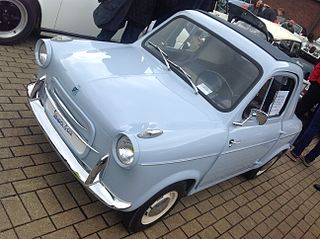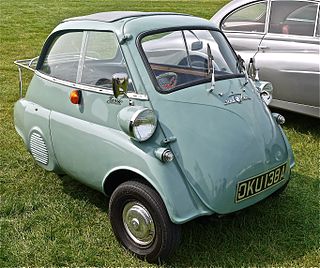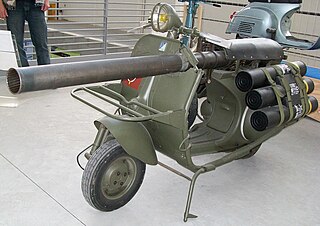
Vespa is an Italian luxury brand of scooter manufactured by Piaggio. The name means wasp in Italian. The Vespa has evolved from a single model motor scooter manufactured in 1946 by Piaggio & Co. S.p.A. of Pontedera, Italy to a full line of scooters and one of seven companies today owned by Piaggio.

Facel S.A. was a French manufacturer of pressed steel automobile components, later complete automobiles of their own design. To intensify its World War II war effort, French subcontracting company for military aeronautics Bronzavia created a subsidiary called Facel in December 1939. After the war, in 1945, by merging with Métallon, Facel began to make short-run special bodies, coupés or cabriolets for Simca, Ford of France, Panhard and Delahaye. Approximately 2,900 cars of all models were hand-built in Facel's short life.

Piaggio & C. SpA is an Italian motor vehicle manufacturer, which produces a range of two-wheeled motor vehicles and compact commercial vehicles under seven brands: Piaggio, Vespa, Gilera, Aprilia, Moto Guzzi, Derbi, and Scarabeo. Its corporate headquarters are located in Pontedera, Italy. The company was founded by Rinaldo Piaggio in 1884, initially producing locomotives and railway carriages.

The Vespa 400 is a rear-engined microcar, produced by ACMA in Fourchambault, France, from 1957 to 1961 to the designs of the Italian Piaggio company. Three different versions were sold, the "Luxe", "Tourisme" and "GT".

The Isetta is an Italian-designed microcar built under license in a number of different countries, including Argentina, Spain, Belgium, France, Brazil, Germany, and the United Kingdom. Because of its egg shape and bubble-like windows, it became known as a bubble car, a name also given to other similar vehicles.

ISO Rivolta is an Italian car and motorbike manufacturer active in the motor vehicle sector since 1938. Over the years, the company has taken various names, including Isothermos, Iso Autoveicoli Spa in 1952, Iso Rivolta in 1962, Iso Motors in 1973 and, in 2017, a return to ISO Rivolta.

The Messerschmitt KR200, or Kabinenroller, is a three-wheeled bubble car designed by the aircraft engineer Fritz Fend and produced in the factory of the German aircraft manufacturer Messerschmitt from 1955 to 1964.

Hans Glas GmbH is a former German automotive company, which was based in Dingolfing. Originally a maker of farm machinery, Glas evolved first into a producer of motor scooters, then automobiles. It was purchased by BMW in 1966, mainly to gain access to Glas's patents; they were the first to use a timing belt with an overhead camshaft in an automotive application. Its limited model range was shortly phased out by its new parent.
Fritz Fend was an aeronautical engineer. He was noted for designing Messerschmitt's Kabinenroller (cabinscooter) KR175 and KR200 microcars, for co-founding FMR, the company that took over production of the Kabinenrollers in 1956, and for designing the FMR Tg500, a sports microcar based on the Kabinenroller. Fend continued his career as an inventor and designer after the KR200 ended production. Fend was working on another lightweight vehicle project shortly before his death.

The Vespa 150 TAP was an anti-tank scooter made in the 1950s from a Vespa scooter for use with French paratroops. Introduced in 1956 and updated in 1959, the scooter was produced by Ateliers de Construction de Motocycles et Automobiles (ACMA), the licensed assembler of Vespas in France at the time. Modifications from the civilian Vespa included a reinforced frame and a three-inch recoilless rifle mounted to the scooter.
Hoffmann was a bicycle manufacturer in Ratingen-Lintorf, Germany. Between 1948 and 1954 the company also manufactured motorcycles. It made a range of models using engines from 125cc to 250cc made by ILO, and the Gouverneur, which had a transversely-mounted 248 cc flat twin four-stroke engine designed by Richard Küchen, and shaft drive. The Gouverneur was developed into the MP 250-2 and finally, in 1953, the S 300 model.

Terrot was a motorcycle manufacturer in Dijon, France.

Casalini is an Italian company, founded by Giovanni Casalini in 1939, that makes mopeds and microcars. Casalini S.r.l. is the oldest microcar producer in the world. The factory is situated in Piacenza.

A scooter or motor scooter is a motorcycle with a step-through frame and a platform for the rider's feet, emphasizing comfort and fuel economy. Elements of scooter design were present in some of the earliest motorcycles, and scooters have been made since at least 1914. Scooter development continued in Europe and the United States between the World Wars.

Renzo Rivolta was an Italian Engineer.

Lambretta is the brand name of mainly motor scooters, initially manufactured in Milan, Italy, by Innocenti.
Micro Mobility Systems Ltd, known as Micro, is a Swiss company that produces urban vehicles such as kickscooters and the Microlino, a small electric car which was first presented at the Geneva Motor Show in 2016. In the United States, Micro's products are sold under the brand "Micro Kickboard" for trademark reasons. The company holds several patents for its products.
ACOMA are a French microcar maker that operated between 1972 and 1984. The cars were designed by Émile Boussereau from Villeneuve-la-Comtesse and produced in Laval from 1970 to 1972 when manufacturing moved to Saint-Barthélemy-d'Anjou, near Angers until production stopped in 1984.














